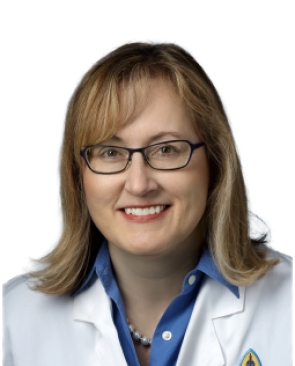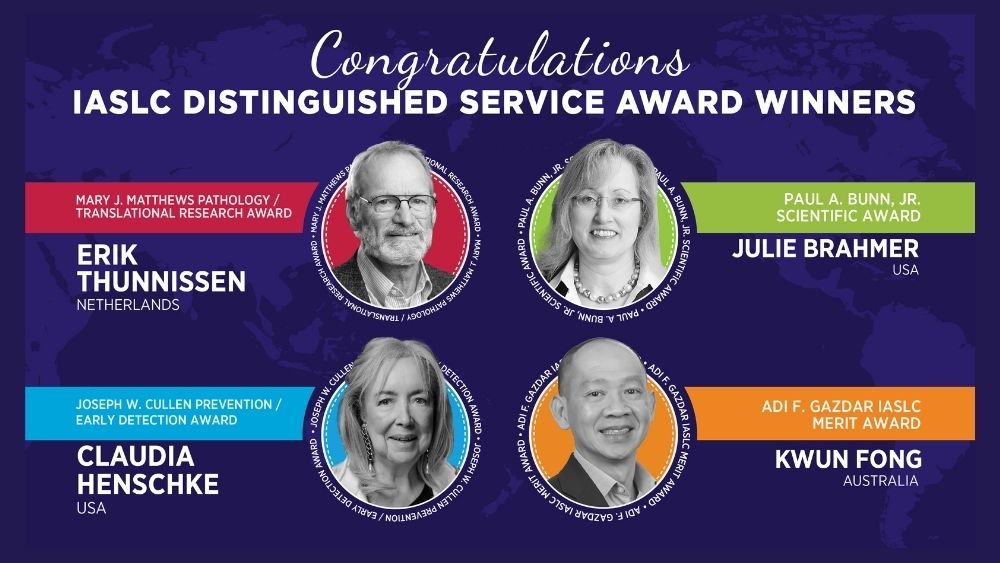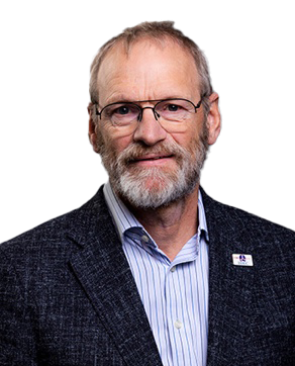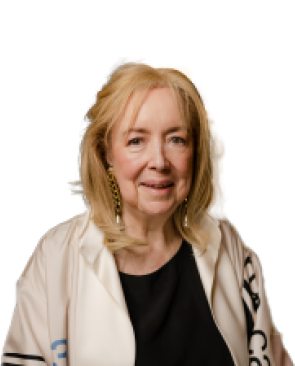The IASLC Distinguished Service Awards recognize the “luminaries” in the field of lung and thoracic cancers- those who are further along in their careers and are more high-level in their field of work- for their outstanding contributions to the field and the IASLC.On behalf of the IASLC Board of Directors, we thank you for your nominations for these important awards.
The IASLC Distinguished Service Awards celebrate the leading figures in lung and thoracic cancer research—those who have made significant, high-level contributions to the field and to the IASLC itself.
Paul A. Bunn, Jr. Scientific Award
The Paul A. Bunn, Jr. Scientific Award is given to an IASLC scientist in recognition of their lifetime achievements in thoracic cancer research. Dr. Paul Bunn’s groundbreaking work set global standards for lung cancer treatment and advanced our understanding of natural history, biomarkers, and therapy selection.
The award was first presented in 1994 to Robert Ginsberg, MD, a thoracic surgeon from Toronto, for his work on the surgical treatment of early-stage lung cancer. In honor of Dr. Bunn’s decade of service as executive director and CEO, the award was renamed in his honor.
Julie R. Brahmer is a 2024 Paul A. Bunn, Jr. Scientific Award recipient

Julie R. Brahmer, MD, MSc, is the Director of the Thoracic Oncology Program and a Professor of Oncology at the Sidney Kimmel Comprehensive Cancer Center at Johns Hopkins. She also co-leads the Cancer Immunology Program, directs the Kimmel Cancer Center at the Johns Hopkins Bayview campus, and is involved in the Johns Hopkins National Clinical Trials Network and oncology cooperative group activities across the campuses. Dr. Brahmer is a leading expert in lung cancer clinical trials, specializing in drug development and immunotherapy.
She earned her undergraduate degree in Chemistry and Philosophy from Creighton University in 1989 and her medical degree from the University of Nebraska Medical Center in 1993. After her residency in Internal Medicine at the University of Utah and a fellowship in Medical Oncology at Johns Hopkins, she focused her research on early-phase immunotherapy trials and international studies of lung cancer treatments. She was instrumental in the development and FDA approval of nivolumab and pembrolizumab for lung cancer.
Dr. Brahmer is actively involved in IASLC, ASCO, AACR, SITC, and lung cancer advocacy organizations, serving on their scientific advisory boards. She has been a member of IASLC since 2000 and has served on various committees, including a three-year term on the IASLC board.
The Adi F. Gazdar IASLC Merit Award
In 2019, the IASLC Board of Directors unanimously decided to rename its Merit Award in honor of Dr. Adi F. Gazdar, recognizing his exceptional contributions to lung cancer research and molecular pathology. The Adi F. Gazdar IASLC Merit Award now celebrates his lifetime of dedication to the field. Each year, the IASLC Executive Committee selects the award recipient, who is announced and honored at the World Conference on Lung Cancer.
Kwun Fong is a 2024 The Adi F. Gazdar IASLC Merit Award recipient
Kwun Fong, born in Malaysia, was supported by his parents’ dedication to his education. He attended an English boarding school and later graduated from the University of London Medical School in 1984 with multiple honors, including the Brackenbury Prize in Medicine and distinctions in several medical fields.
His specialist training and PhD studies in Australia fueled his passion for lung cancer research, earning him several awards such as the 1992 CIG Best Paper Prize and the 1993 Young Investigator Award. Inspired by leaders at his first World Conference on Lung Cancer, he pursued post-doctoral training at UT Southwestern under John Minna and Adi Gazdar, which shaped his vision for advancing lung cancer research in Malaysia.
In Australia, his contributions were recognized with awards like the 1999 TW White Prize and various fellowships. As Clinical Manager at The Prince Charles Hospital, he helped establish a successful multidisciplinary care model. His ongoing work with the IASLC Staging Project, TCGA, Pan-Cancer Analysis of Whole Genomes, and the US NCI Sherlock project underscores his commitment to advancing the field.
Mary J. Matthews Pathology/Translational Research Award
The Mary J. Matthews Pathology/Translational Research Award honors an IASLC scientist for their lifetime achievements in the pathology and translational research of thoracic cancers. Dr. Matthews was a senior investigator and pathologist at the National Cancer Institute’s Medical Oncology Branch, where she played a crucial role in defining the histologic subtypes of lung cancer and understanding how these subtypes relate to the disease’s progression. The award’s inaugural recipient in 1994 was Geno Saccommano, MD, PhD, who devoted his career to developing a groundbreaking technique for the early detection of lung cancer.
Erik Thunnissen is a 2024 Mary J. Matthews Pathology/Translational Research Award recipient
Dr. Erik Thunnissen, now retired, is a research associate at the Department of Pathology, Amsterdam Medical University, VUmc. After completing his pathology training in 1982 and a PhD in 1987 on an early AI topic, he studied clinical epidemiology in Maastricht.
In 1992, he founded the Dutch Pulmonary Pathology and Molecular Pathology Working Groups. He created a model linking epitope concentration to staining intensity and led quality assessment programs for the European Society of Pathology and UKNEQAS.
Dr. Thunnissen contributed to IASLC’s molecular pathology guidelines for targeted therapy in 2013 and 2018. He is known for enhancing the reproducibility of lung adenocarcinoma invasion assessments with a revised classification system that shows better consistency and less variability than the WHO system. He also questions the validity of STAS (spread through air spaces) and is currently validating his classification system with a large study.
Joseph W. Cullen Prevention/Early Detection Award
The Joseph W. Cullen Prevention/Early Detection Award celebrates an IASLC scientist who has made significant contributions to preventing thoracic cancers. Dr. Cullen, who was Deputy Director of the National Cancer Institute’s Division of Cancer Prevention and Control, founded the Smoking, Tobacco, and Cancer Program at the NCI in 1982. The first award in 1994 went to Jesse Steinfeld, MD, the U.S. Surgeon General who was instrumental in passing the National Cancer Act of 1971.
Claudia Henschke is a 2024 Joseph W. Cullen Prevention/Early Detection Award Recipient





